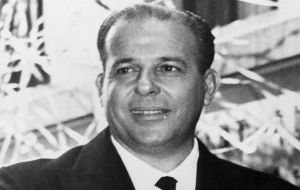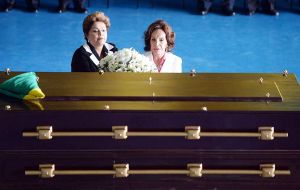MercoPress. South Atlantic News Agency
Kennedy in 1963 considered a military intervention in Brazil; a coup followed in 1964
 US president Kennedy feared Brazil was moving too close to Fidel Castro's Cuba
US president Kennedy feared Brazil was moving too close to Fidel Castro's Cuba  Ever smiling former president Jango Goulart was a rich farmer who died in exile in strange circumstances
Ever smiling former president Jango Goulart was a rich farmer who died in exile in strange circumstances  Last November Goulart remains were buried with full state honors, Rousseff heading the ceremony
Last November Goulart remains were buried with full state honors, Rousseff heading the ceremony Former US President John F Kennedy mulled possible military intervention in Brazil one year before the 1964 coup that ousted then constitutional president Joao Goulart, according to archive documents released on Tuesday.
Audio was released on journalist Elio Gaspari's dictatorship archives website (http://arquivosdaditadura.com.br) containing a collection of documents relating to the 1964 establishment of the military dictatorship that lasted 21 years.
At a White House meeting on October 7 1963, 46 days before he was assassinated, Kennedy asked his ambassador in Brasilia, Lincoln Gordon: “What about the ...Do you see a situation coming where we might be, find desirable, to intervene militarily ourselves?,” according to a public transcript published on the website.
“Well, this is the other category, which I call 'Dangerous Contingency possibly requiring rapid action'. This is the very problem,” Gordon responded.
Earlier, the US diplomat said the White house should await clearer signs that Brazil was moving toward the Fidel Castro model in Cuba - Washington's nemesis in the Western Hemisphere - to justify an intervention.
Such an operation proved unnecessary as the Brazilian military moved in April 1964 to depose Goulart, and the US quickly recognized the junta.
The conversation took place during two days of talks Kennedy had with members of his cabinet to assess developments in Brazil and Vietnam, according to the website.
The audio was part of a set of secret tapes ordered by Kennedy of all his White House meetings since 1962. The first tape was of another conversation with Gordon in which the option of a coup in Brazil was also raised.
But even when the coup finally was undertaken by the Brazilian military with strong support from a divided Catholic church, US Navy an air carrier with support vessels was at the time steaming along the Brazilian coast.
The core of the military officers involved in the coup during World War II had participated as part of the Brazilian effort as aircraft pilots and ground troops in Italy under US command. Brazilian infantry and artillery fought in Montecasino.
Many of these officers returned to Brazil fascinated with the US “national security” policy implemented in the forties to ensure that the economy was clearly directed to support in all ways the war effort, and later the recovery of Western Europe.
But the ousting of Goulart, in the midst of the Cold War, was not unanimous since the Brazilian Army was divided on the issue but the president finally went to exile in neighboring Uruguay, dropping any resistance attempt arguing he could never accept a bloodshed.
Goulart who was a rich cattle and rice farmer from the southern state of Rio Grande do Sul, died in strange circumstances in Argentina in 1976. He was returned to Brazil in a coffin and buried in his hometown Bagé with no honors.
However last November the current government of president Dilma Rousseff had his body exhumed and analyzed for possible poisoning as the main cause of his death, as his family has long claimed.
The toxicology test results have yet to be made public and could take months but last November former president Jango Goulart remains received full state honors with Rousseff heading the ceremony.
Goulart was the only Brazilian president to be buried without the honors usually given to a former head of state. “Today, Brazil is having a meeting with its history,” President Rousseff wrote on Twitter at the time adding that the celebration was an affirmation of Brazilian democracy.
Goulart's family and a number of authorities and former presidents, including Lula da Silva and Fernando Collor de Mello, took part in the state ceremony that welcomed former President Joao Goulart's remains into the capital.
Nowadays Goulart is described as a progressive leader with left-wing sympathies, who during the height of the Cold War triggered many fears both domestically and internationally. Before becoming president, Goulart had been a member of congress, Labor minister and was sponsored by probably Brazil's most influential president in the last century, Getulio Vargas, who helped transform the agrarian feudal country by setting the foundations for an industrialized Brazil.




Top Comments
Disclaimer & comment rules-

-

-

Read all commentsits always interesting that most of us have to wait 30 odd years just to find out what might have been,
Jan 09th, 2014 - 11:03 am 0yet one may feel just how lucky we all are that it did not happen.?
depending on ones point of view..
http://www.upworthy.com/one-of-matt-damons-finest-performances-was-never-in-theaters?c=upw1
Jan 09th, 2014 - 03:00 pm 0This is what one contemporary of Kennedy - Historian Howard Zinn - thought of the American Way Of Life.
Matt Damon brings it to life for us.
Like all revelations in history, judgement should be based on the context of the times.
Jan 09th, 2014 - 06:02 pm 0Commenting for this story is now closed.
If you have a Facebook account, become a fan and comment on our Facebook Page!